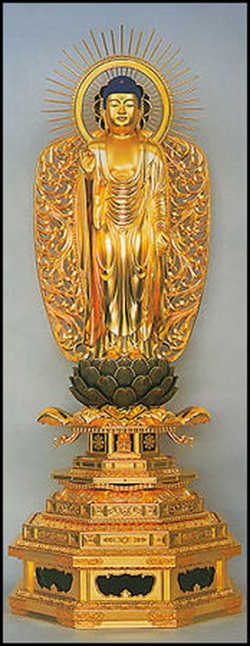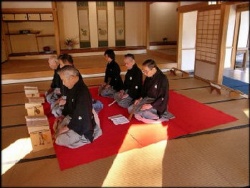The 108 Defilements of Buddhism
While investigating the number 108 I became curious about these 108 defilements (also called "impure thoughts", "vices" or "evils", or "earthly desires") and wanted to get a list. I found the following items at this page. I put them in alphabetical order, then added definitions (from the Oxford American dictionary) for any words I did not know.
Later articles, such as this one quote my text including the added definitions. I provide some other sources in the footnotes section.
In the list I found, the 108 items appear to have been translated roughly into English. Note some apparent duplications (for example, "deceit" and "deception"; "disrespect" and "disrespectfulness"). I believe these result from the imperfection of translation from the original language/culture into English.
abuse; aggression; ambition; anger; arrogance; baseness; blasphemy; calculation; callousness; capriciousness (unaccountable changes of mood or behavior); censoriousness (being severely critical of others); conceitedness; contempt; cruelty; cursing; debasement; deceit; deception; delusion; derision; desire for fame; dipsomania (alcoholism characterized by intermittent bouts of craving); discord; disrespect; disrespectfulness; dissatisfaction; dogmatism; dominance; eagerness for power; effrontery (insolent or impertinent behavior); egoism; enviousness; envy; excessiveness; faithlessness; falseness; furtiveness; gambling; garrulity (tediously talking about trivial matters); gluttony; greed; greed for money; grudge; hard-heartedness; hatred; haughtiness; high-handedness; hostility; humiliation; hurt; hypocrisy; ignorance; imperiousness (assuming power or authority without justification); imposture (pretending to be someone else in order to deceive); impudence; inattentiveness; indifference; ingratitude; insatiability; insidiousness; intolerance; intransigence (unwilling or refusing to change one's views or to agree about something); irresponsibility; jealousy; know-it-all; lack of comprehension; lecherousness; lying; malignancy; manipulation; masochism; mercilessness; negativity; obsession; obstinacy; obstinacy; oppression; ostentatiousness; pessimism; prejudice; presumption; pretence; pride; prodigality (spending money or using resources freely and recklessly); quarrelsomeness; rage; rapacity (being aggressively greedy or grasping); ridicule; sadism; sarcasm; seducement; self-denial; self-hatred; sexual lust; shamelessness; stinginess; stubbornness; torment; tyranny; unkindness; unruliness; unyielding; vanity; vindictiveness; violence; violent temper; voluptuousness; wrath
Note the British spelling pretence and the rare word seducement (which, as one would expect, means "seduction" (the act), but can also mean "something that serves to seduce").
Combinatorial Constructions
I have also found sources that build up the number 108 through multiple permutations of attributes that are combined in each each possible way. Here is an example2:
What are the six feelings? The feelings born of sense-impression through eye, ear, nose, tongue, body and mind.
What are the eighteen feelings? There are the (above) six feelings by which there is an approach (to the objects) in gladness; and there are six approaches in sadness and there are six approaches in equanimity.
What are the thirty six feelings? There are six feelings of gladness based on the household life and six based on renunciation; six feelings of sadness based on the household life and six based on renunciation; six feelings of equanimity based on the household life and six based on renunciation.
What are the hundred and eight feelings? There are the (above) thirty six feelings of the past; there are thirty six of the future and there are thirty six of the present.
Which constructs the number 108 as
{eye, ear, nose, tongue, body, mind} × {gladness, sadness, equanimity} × {household life, renunciation} × {past, future, present}
= 6×3×2×3 = 108
Another almost identical construction, using different words, is quoted on the Wikipedia page for Buddhist prayer beads:
In traditional Buddhist thought, people are said to have 108 afflictions or klesas. There are six senses (sight, sound, smell, taste, touch, and consciousness) multiplied by three reactions (positive, negative, or indifference) making 18 "feelings." Each of these feelings can be either "attached to pleasure or detached from pleasure" making 36 "passions", each of which may be manifested in the past, present, or future.
which corresponds to:
{sight, sound, smell, taste, touch, and consciousness} × {positive, negative, indifferent} × {attached to pleasure, detached from pleasure} × {past, present, future}
= 6×3×2×3 = 108
More Complicated Constructions
Most of the original (Asian) sources give lists of defilements that are built up in a more complicated way. There are many different versions that total 98, some of which are mentioned by Hirakawa and Groner8. For another example see the chart given by Korin9. To these 98 are usually added ten "bonds", or "secondary defilements" (upaklesa):
absence of shame, absence of embarrassment, jealousy, parsimony, remorse, drowsiness, distraction, torpor, anger, concealment of wrongdoing
Footnotes
Here are my sources and some other material related to 108 and Buddhism:
1 : Charles C. Goodin, Hyaku Hachi No Bonno: The Influence of The 108 Defilements and Other Buddhist Concepts on Karate Thought and Practice
(Describes a 36+31+31+10 construction: "[...] 36 proclivities of the realm of desire, 31 proclivities of the realm of form, 31 proclivities of the realm of formlessness, [and] 10 bonds or secondary defilements [...]")
2 : DharmaNet International, In the Sky -- II, from Vedana-Samyutta, (translated from the Pali, with an Introduction by Nyanaponika Thera), 1983.
(The source of the "combinatorial construction" that I quote above)
3 : Peter Johnson, The 108 Kinds of Emotional Desires (Klesas), 2001.
4 : Stefan Laug (silent-light.de), The 108 Defilements, documenting an art installation and performance given in Reru, Zanskar in the Himalayans, North of India, 2002 Aug 14-15.
This page has moved (see next footnote) but it was preserved by archive.org and can be seen here. The list of 108 "defilements" has exactly the same 108 words/phrases as on the VirtueScience source, but in a different order. I suspect it was their source.
5 : Stefan Laug (silent-light.de), The 108 Defilements.
Has an updated version of the 2002 list used by VirtueScience. The words have been reordered and 15 items were refined. For example, "seducement" was changed to "seduction", and "know-it-all" was changed to "being a know-all".
6 : VirtueScience.com, Spiritual Sciences Forum, The 108 Defilements of Buddhism.
The article from which I originally got the list above.
7 : Yahoo Answers, user "Vajrasiddha", response to question Why is the number 108 sacred to Buddhism?, early 2010.
Quotes my list in the same order I use, and including my added definitions. They credit "耶穌轉換為佛教經" as a source, but I was not able locate this Chinese text anywhere (which seems to mean "Jesus conversion to Buddhist scriptures" or perhaps "Christianity [related to] Busshism").
8 : Akira Hirakawa and Paul Groner, A history of Indian Buddhism: from Shakyamuni to early Mahayana, 1993, ISBN 81-208-0955-6.
9 : "Korin" (username "abhidharmakosa"), Anusaya -- Latent Defilements (study materials for the Abhidharma-kosa, chapter 5), 2010.




